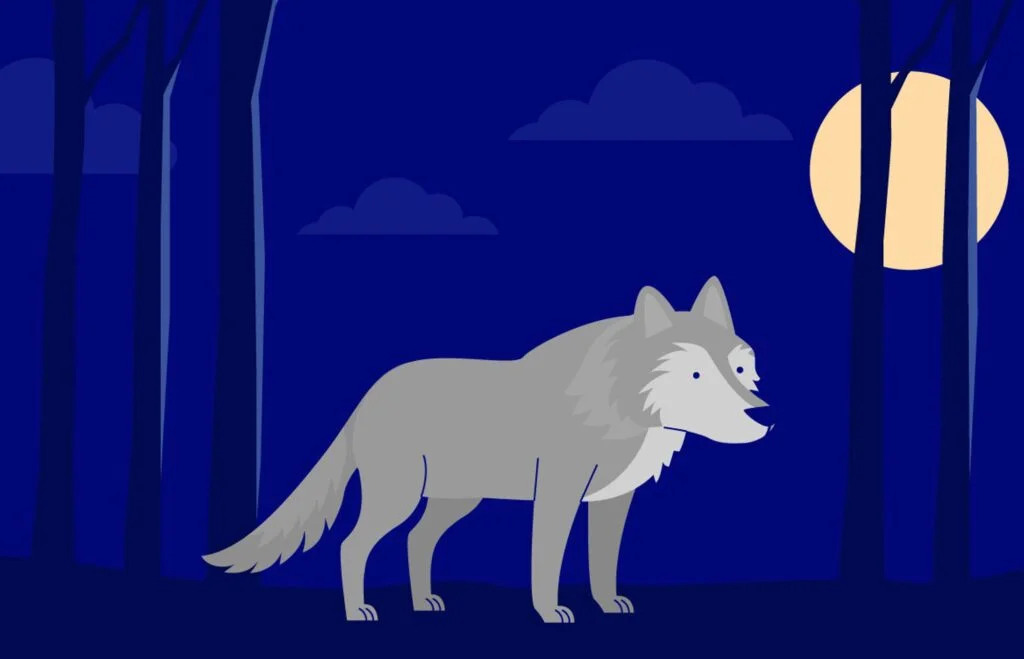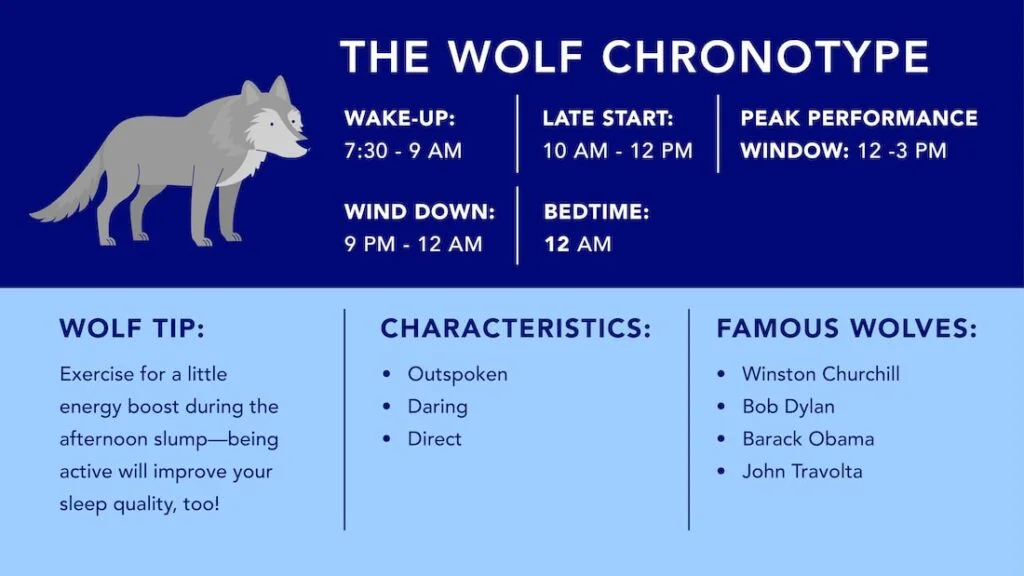
Lion, dolphin, bear, and wolf-like chronotypes are so named because their sleep habits match that of their animal namesakes. Wolves, for example, are predatory diurnal animals most active at dusk and dawn. And while people who fall into the wolf chronotype may not be predatory, they’re most certainly more active at the end of day. Also known as night owls, wolf chronotypes do their best work under the cover of night, and because they knock out late, they also wake later in the morning. Ahead we take a closer look at the wolf chronotype, which was introduced by Dr. Michael J. Breus, PhD, in 2016. Beyond looking at wolf sleep habits, we examine the wolf personality to find out what makes them tick. Not sure what chronotype you are? Take our quick chronotype quiz to find out!
Fast Facts on the Wold Chronotype
- Chronotypes can influence your sleep schedule, personality, and preferences for meal timing and exercise .
- The wolf chronotype sleep schedule is late to bed and late to rise.
- Wolves tend to be open to new experiences, anxious, and cunning.
What Is a Chronotype?
Dr. Chester Wu, a double board-certified doctor in Psychiatry and Sleep Medicine, tells Sleepopolis, “Chronotype refers to your innate inclination to sleep, wake up, and be alert or at rest at particular times during the day.” Wu adds, “It’s not just about being an early bird or a night owl. Chronotypes exist on a continuous spectrum, with a significant portion of us falling somewhere in the middle.”
And while genetics are a key factor in determining your chronotype, Wu tells us that there’s more to consider, like age, sex, and environmental cues. Specifically, Wu says, “Chronotypes tend to lean later during adolescence and earlier with increasing age, and while men lean more towards evening types than women before age 40, the trend reverses after 40.” And last but not least, Wu notes that “Zeitgebers (environmental cues that synchronize your circadian rhythm to the world around you, including light (the strongest), meals, and exercise)” also play an important role in where you land on the chronotype spectrum.
The Wolf Chronotype
Studies show that an estimated 40 percent of adults are either morning or night people, while the majority fall somewhere in between. Of that 40 percent, some are “night owls.” They may identify as a wolf chronotype and typically have more energy later in the day. Peak productivity for wolf chronotypes is late morning and again in the late evening. Like any chronotype, it’s best to plan their schedules accordingly to capitalize on those bursts of productivity. The wolf personality type is outspoken, direct, and daring.
The Best Wolf Chronotype Sleep Schedule
Wolves like to burn the midnight oil, so bedtime for them may often be somewhere around midnight. As a result, you’ll find this chronotype sleeping in later than most, possibly rising sometime after 7:30 a.m.
A typical wolf chronotype sleep schedule may look something like this.
Wake Up: 7:30 to 9:00 a.m.
Wolves typically have a late start in the morning, waking up around 7:30 a.m. or even later.
Late Start: 10 a.m. – 12 p.m.
It might take a while for wolves to get into the swing of things, so the early part of their day can be reserved for lighter tasks that don’t require a lot of focus.
Peak Performance Window : 12 p.m. – 9 p.m.
The wolf peak performance window is around midday. Ideally, wolves should lean into their chronotype and schedule more complicated tasks and demanding projects in the hours immediately following lunch. Then, they’ll feel a burst of energy just when the world around them is starting to wind down. Evidence suggests wolf chronotypes use more effort and move slower in the morning hours.
Wind Down: 9 p.m. – 12 a.m.
After their burst of evening energy, Wolves may use the hours just before midnight to relax and wind down.
Bedtime: 12 a.m.
For these night owls, bedtime may not be until around midnight or later. While wolf sleep habits often find them hitting the sack later than most, these guys tend to make up for it with later wake-up times. The wolf chronotype sleep schedule may be wonky to some, but rest assured, these guys are getting their recommended 7 to 9 hours.
Tips for Getting Through the Day as a Wolf Chronotype

To help wolves get through the day, schedule adjustments, regular exercise, and sticking to a consistent routine are key.
Adjust Your Schedule
If possible, wolf chronotypes should adjust their work or school schedules to accommodate midnight bedtimes and late morning wake-ups.
Prioritize Your Mental Health
Research shows that depression and other psychiatric disorders like seasonal affective disorder and substance dependence are more prevalent in eveningness. Loneliness often follows those on an extreme schedule like wolves. You may also find processing emotions challenging at times. As a result, you may not receive the best quality of sleep, which may worsen your mental health. It is best to speak with your doctor if you experience depression, loneliness, or substance dependence. They can help you with treatment options and best ways to manage your schedule.
Exercise and Healthy Eating
Exercise can give wolf chronotypes a little energy boost if they’re in a slump while also improving their sleep quality. Studies suggest wolf chronotypes are more susceptible to diabetes, obesity, and cardiovascular disease.They can also experience poorer quality of sleep. So, regular exercise and a well-balanced diet are great steps in preventing health issues.
FAQs
How should a wolf chronotype eat?
Wolf chronotypes are at a higher risk of developing obesity. So, it is best to practice healthy lifestyle habits. They may also eat too quickly, leading to more calories consumed. Ensure you take your time eating to identify when you are full. Finally, they may skip breakfast, which isn’t always the healthiest choice when trying to keep your diet balanced and healthy. Prioritize eating breakfast when you awaken in the morning, even if it is a light breakfast, like fruit or toast.
What is a wolf chronotype personality?
The wolf personality type is outspoken, direct, and daring.
The Last Word From Sleepopolis
While chronotypes play a significant role in our sleep habits and schedules, they can also affect our personality traits and preferences for meal timing and exercise. Wolf chronotypes are the night owls of the group. As such, these folks like to stay up late and sleep in come morning. While wolves take some time to get going in the morning, they typically have more energy later in the day. Where possible, wolf chronotypes should try to adjust work or school schedules that allow for late evening productivity and late morning starts.
Sources
Ray Norbury (2022) Night Owls and Lone Wolves, Biological Rhythm Research, 53:11, 1702-1710, DOI: 10.1080/09291016.2021.2014083
Kivelä, L., Papadopoulos, M. R., & Antypa, N. (2018). Chronotype and Psychiatric Disorders. Current sleep medicine reports, 4(2), 94–103. https://doi.org/10.1007/s40675-018-0113-8
Kobayashi Frisk, M., Hedner, J., Grote, L. et al. Eveningness is associated with sedentary behavior and increased 10-year risk of cardiovascular disease: the SCAPIS pilot cohort. Sci Rep 12, 8203 (2022). https://doi.org/10.1038/s41598-022-12267-5
KNAIER, RAPHAEL1,2; QIAN, JINGYI1,2; ROTH, RALF3; INFANGER, DENIS3; NOTTER, TIMO3; WANG, WEI1; CAJOCHEN, CHRISTIAN4,5; SCHEER, FRANK A. J. L.1,2. Diurnal Variation in Maximum Endurance and Maximum Strength Performance: A Systematic Review and Meta-analysis. Medicine & Science in Sports & Exercise 54(1):p 169-180, January 2022. | DOI: 10.1249/MSS.0000000000002773
Randler C, Engelke J. Gender differences in chronotype diminish with age: a meta-analysis based on morningness/chronotype questionnaires. Chronobiol Int. 2019 Jul;36(7):888-905. doi: 10.1080/07420528.2019.1585867. Epub 2019 May 9. PMID: 31070061.
Nimitphong, H., & Siwasaranond, N. (2018). The relationship among breakfast time, morningness–eveningness preference and body mass index in Type 2 diabetes. Diabetic Medicine, 35(7), 964-971. https://doi.org/10.1111
Lenneis A, Vainik U, Teder-Laving M, Ausmees L, Lemola S, Allik J, Realo A. Personality traits relate to chronotype at both the phenotypic and genetic level. J Pers. 2021 Dec;89(6):1206-1222. doi: 10.1111/jopy.12645. Epub 2021 Jun 9. PMID: 33998684.
Dr. Chester Wu. Email Communication. June 8, 2024.

























